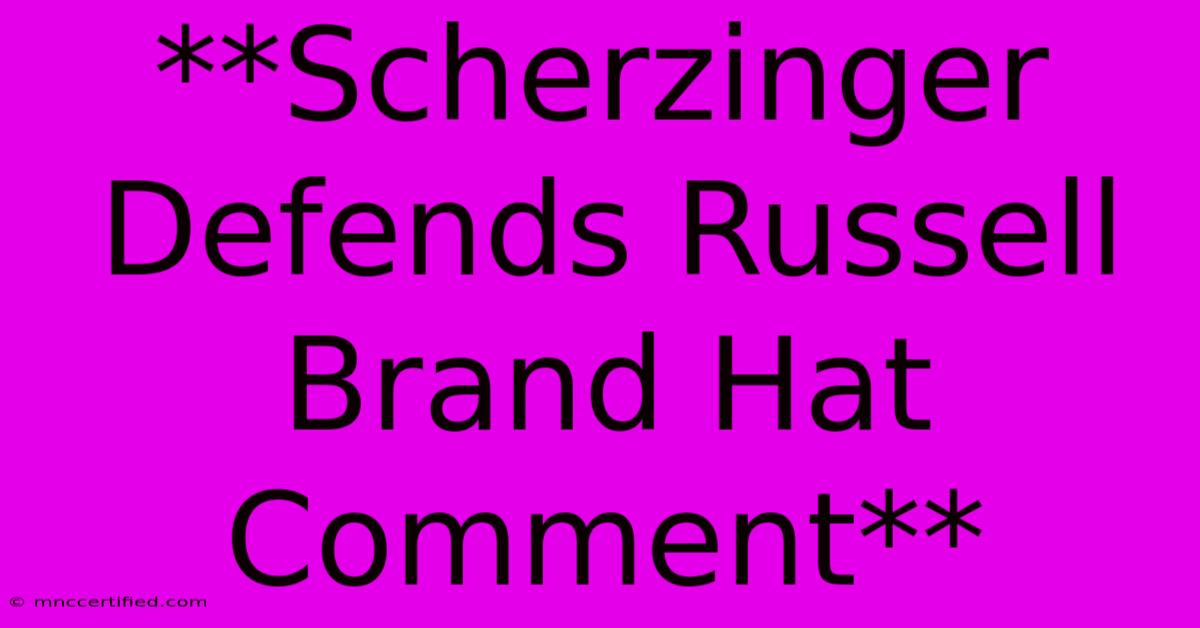**Scherzinger Defends Russell Brand Hat Comment**

Table of Contents
Scherzinger Defends Russell Brand's Hat Comment: A Deeper Dive into the Controversy
The internet erupted with reactions after comedian Russell Brand made a comment about Nicole Scherzinger's hat during an interview. The comment, deemed insensitive by many, sparked a heated debate online, forcing Scherzinger to step in and defend Brand.
What Happened?
During an interview on the "Late Late Show with James Corden," Brand, known for his unconventional humor, made a comment about Scherzinger's hat. He likened it to something a "gangster's moll" would wear, drawing parallels to the fashion choices of the 1920s.
While some found the comment amusing, many perceived it as insensitive and outdated, with criticism pouring in across social media. Many pointed out the problematic nature of the comparison, arguing that it perpetuated harmful stereotypes and trivialized the complexities of female fashion choices.
Scherzinger Steps In
In a swift and unexpected response, Scherzinger took to social media to defend Brand, stating that his comment was "just a joke" and that he is a "true gentleman." This statement further fuelled the debate, with some applauding Scherzinger for her support of Brand, while others criticized her for overlooking the problematic nature of his words.
Examining the Controversy
The controversy surrounding Brand's comment highlights the delicate balance between humor and sensitivity. What might be perceived as playful banter by some can be deeply offensive to others. This incident underscores the need for comedians to be mindful of their audience and the potential impact of their jokes, particularly in an era where online scrutiny is ever-present.
It also raises questions about the role of celebrities in navigating such controversies. While some celebrities might choose to remain silent, Scherzinger's decision to defend Brand, albeit with a focus on his character, sparked further debate and highlighted the complexities of navigating public opinion in the digital age.
Beyond the Headlines
Beyond the immediate reactions, the incident presents a valuable opportunity to reflect on the evolving landscape of humor and the increasing importance of sensitivity in public discourse. It also invites us to consider the responsibility of celebrities in navigating online controversies and the potential impact of their actions on public perception.
While the debate surrounding Brand's comment might have subsided, the underlying themes of sensitivity, humor, and celebrity responsibility continue to resonate. As our online world becomes increasingly interconnected, the challenge of finding a balance between freedom of expression and the avoidance of offense remains a critical one.

Thank you for visiting our website wich cover about **Scherzinger Defends Russell Brand Hat Comment** . We hope the information provided has been useful to you. Feel free to contact us if you have any questions or need further assistance. See you next time and dont miss to bookmark.
Featured Posts
-
Transamerica Occidental Life Insurance
Nov 09, 2024
-
1st T20 I Highlights Samson Ton Powers India To Victory
Nov 09, 2024
-
Live Game Ucla Bruins Vs Iowa Hawkeyes
Nov 09, 2024
-
Nepal Opens Asia Qualifier With Victory
Nov 09, 2024
-
Midwives Near Me That Accept Insurance
Nov 09, 2024